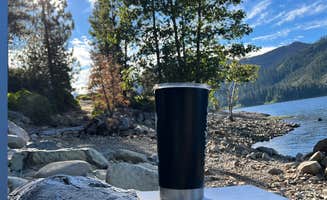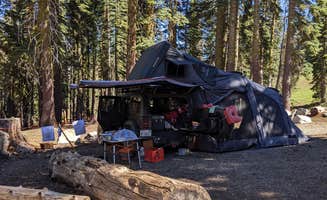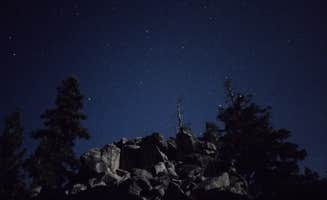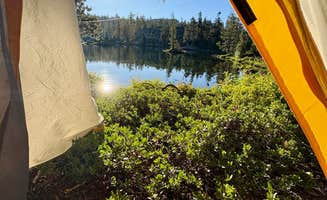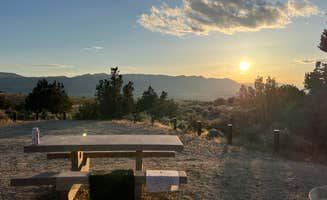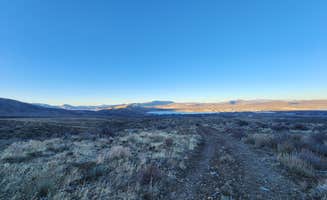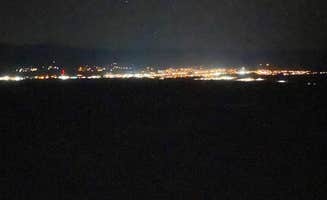Dispersed camping near Clio, California occurs in a high elevation ecosystem where temperatures can range dramatically between seasons, typically 20-30°F cooler than valley floors. Most camping areas sit between 5,000-7,000 feet, contributing to excellent star visibility and distinct seasonal challenges. Winter conditions often close access roads from November through May, with lingering snowpack possible into June at higher elevations.
What to do
Mountain biking trails: The Fort Sage Off Highway Vehicle Area provides extensive trail systems for mountain bikers beyond its OHV focus. "This place is so wonderful and free. We were the only people in our camp area for the entire stay," notes one visitor about the uncrowded conditions. "Trail riding galore. Went on all the trails and out in the sand dune area we came upon wild horses, this was quite a site to see."
Swimming opportunities: Loch Leven Lakes offers exceptional swimming during summer months. "We swam in the lake and napped in our hammocks," shares one backpacker who found the upper lake less crowded than the middle lake. The water temperatures remain cool even in August, providing refreshing relief during hot days.
Wildlife observation: Wild horses roam freely around the Fort Sage area, creating unexpected wildlife viewing opportunities. "Went on all the trails and out in the sand dune area we came upon wild horses, this was quite a site to see. They were just running and being playful," reports one camper. Early mornings and dusk provide the best wildlife viewing conditions throughout the region.
What campers like
Cell service availability: Despite remote locations, some dispersed sites maintain surprising connectivity. At Lake Valley Rd Pullout, one camper notes, "We actually had cell reception with Verizon and ATT here, which surprised us." This allows for emergency communication while still enjoying seclusion.
Fishing access: Bowman Lake Dispersed provides quality fishing opportunities during summer months. A visitor describes it as "a great fishery, and there are plenty of inspirational views and solitude to be had." The lake supports multiple fish species and remains relatively uncrowded due to challenging access requirements.
Clean facilities: The Fort Sage area receives consistent praise for maintenance standards. "Cleanest pit toilets we've experienced anywhere. Great access from highway. All amenities (table, fire pit, cooker) all appear new," notes a recent visitor. Another adds, "Pristine spot. Cleanest pit toilets ever and they are lit up (great for late arrival)."
What you should know
Road conditions vary significantly: Grouse Ridge Campground requires careful driving consideration. "The last five miles to get to this campground was narrow and rocky. The road was much more technical than a standard forest service road, but doable in most stock crossover vehicles or better," explains one camper who navigated the terrain successfully.
Snow closures persist late into spring: Lake Valley Road remains under snow well into the traditional camping season. "We were looking for an overnight spot in this area and checked out this listing but there's just still too much snow at this time. The weather isn't cold, but the snow plows have pushed all the snow off the road so that it's impossible to get to any pullouts," reports a May visitor.
Insect preparation: Mosquitoes can be prevalent at certain sites, particularly near water. One Bowman Lake visitor warns, "Mosquitoes are abundant here. Don't forget your repellent." Even in higher elevation areas with less standing water, evening insect activity increases significantly during summer months.
Tips for camping with families
Consider trail difficulty for children: When backpacking to Kyburz Flats, families should note road conditions. "Road is rough, especially after first mile to interpretive site. The last mile gets rougher. Was fine in my 2wd van but have high clearance and was dry. Might be worse if muddy or low clearance vehicle," advises one visitor, suggesting families might prefer the more accessible first mile.
Pet-friendly options: Multiple dispersed sites welcome dogs without restrictions. One camper chose Kyburz Flats specifically for this reason: "I went to stay at a paid campground nearby but they said my dogs would have to be leashed, so he suggested this place for us." The open terrain provides ample space for pets to explore safely.
Educational opportunities: The Kyburz Flats historic sheep camp offers educational value for families. The site maintains interpretive displays about the area's history, making it suitable for combining camping with learning experiences. "Coordinates lead to historic sheep camp site. Can probably camp next to it but better spots just beyond," notes one visitor.
Tips from RVers
Big rig accessibility: Big Dog Valley provides options for larger vehicles despite limited infrastructure. "Really great spots for quick close camp trip," notes one RVer, though another cautions, "Rudimentary campsites, no fire rings or tables at any of the campsites. The cement pullouts are still there." The accessible pullouts accommodate larger rigs without requiring technical driving.
Wind considerations: Fort Sage area experiences significant wind patterns that RVers should prepare for with proper stabilization. "We will come back," notes one RVer appreciating the "spacious, quiet" conditions despite occasional wind challenges. The open terrain provides minimal natural windbreaks.
Seasonal RV considerations: Higher elevation sites like Grouse Ridge have shorter seasons for RV access. "We were there last weekend in June and there was still snow on the ground. Woot! It was awesome," reports one camper, highlighting how even summer visits can encounter snow. This limits practical RV camping to July through September in many locations.


